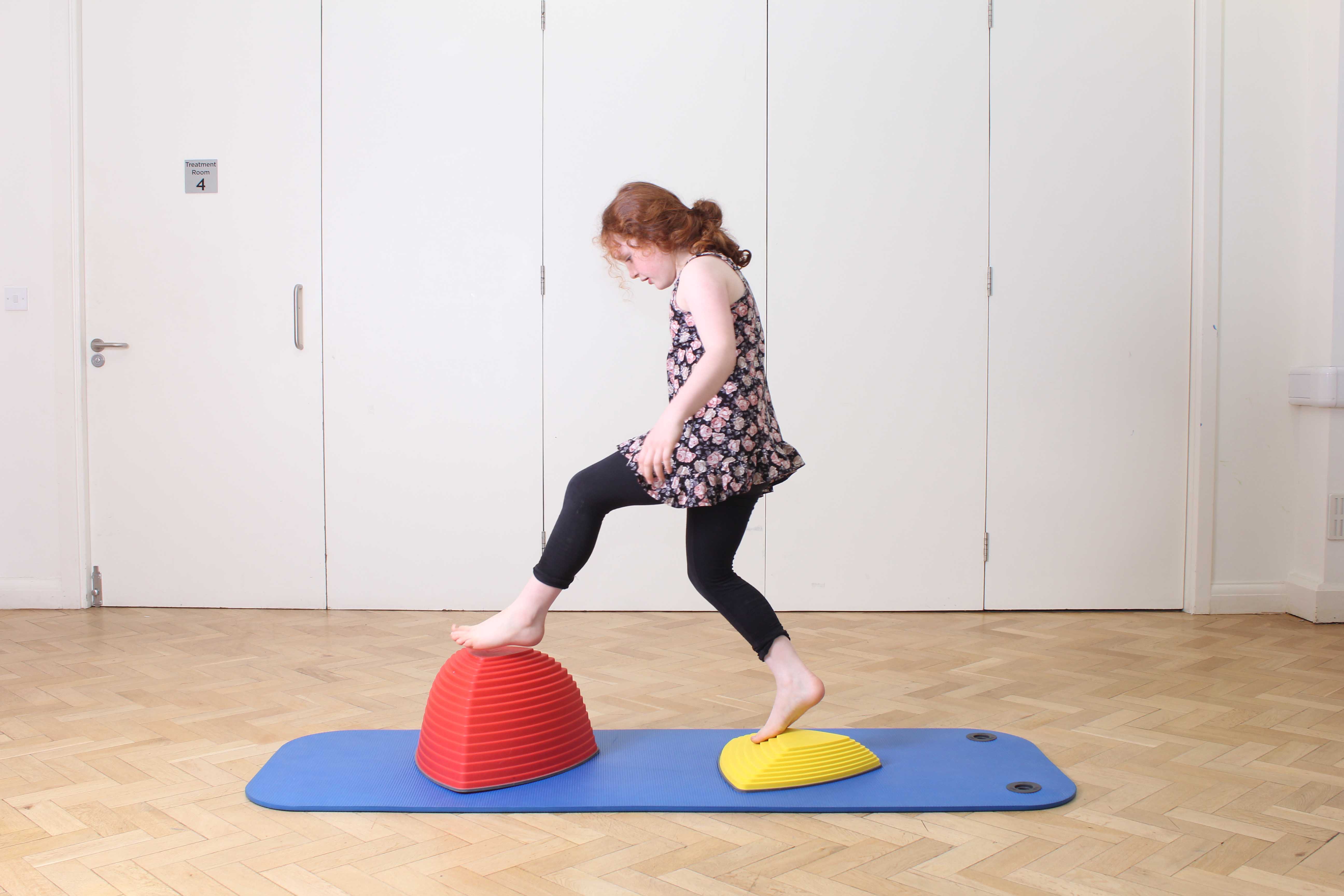Types of Autistic spectrum disorder
The three forms of autistic spectrum disorder are:
- Classic autism
- Asperger syndrome
- Pervasive developmental disorder not otherwise specified (PDD-NOS)
 Above: Mobility and co-ordination exercises to improve functional independent movement
Above: Mobility and co-ordination exercises to improve functional independent movementSymptoms of Autistic spectrum disorder
Autistic spectrum disorder affects everyone differently. Your child may have difficulty communicating, engaging and interacting with others. This makes it very difficult for your child use playtime to make and maintain friendships. It is noticed that the individual may have difficulty making eye contact and showing affection to others, even close family. Children with autism can be very focused on some activities and interests and reluctant to participate in others. They often like to adhere to strict daily routines and rituals. If the routines are broken for some reason, the child will respond anxiously commonly displaying repetitive movements such as hand flapping or hair twisting.
However these difficulties can be overcome with appropriate therapy. Individuals with autism are often very open and honest and very good at learning new facts and talents.
Cause of Autistic spectrum disorder
Autistic spectrum disorder is caused by abnormal brain development and the predominant cause of that are genetic factors. Environmental factors such as infections, solvents, diesel exhaust, pesticides, alcohol, smoking, illegal drugs may contribute to autism and the extent is being investigated. The risk of autism is increased with the age of the mother and father, diabetes and the use of psychiatric medicines during the pregnancy. There is no scientific evidence that vaccines increase the risk of autistic spectrum disorder.
Diagnosis of Autistic spectrum disorder
Autistic spectrum disorder is diagnosed by a developmental paediatrician with support from a multi-disciplinary team. It cannot be diagnosed by a medical test so the diagnosis is formed via a series of interviews, observation and thoughtful analysis.
Treatment of Autistic spectrum disorder
There is no definitive treatment for autistic spectrum disorder. There are a variety of methods and approaches used by different health professionals. Treatment includes medication and supplements, psychotherapy, speech and language therapy, physiotherapy, occupational therapy, applied behavioural analysis, complementary therapy and dietary changes.
Physiotherapy for autistic spectrum disorder
Most people with autism have physical as well as psychological difficulties. Physiotherapists work with people of any age with autism to improve:
- Mobility – standing, walking, running
- Transfers – sit to stand, in and out of bath, up and down stairs
- Cardiovascular fitness
- Social skills through activities/ play
- Muscle strength
- Co-ordination
- Hand dexterity
- Balance and core stability
Treatment sessions will be fun and challenging and can be carried out at home, school or in one of our clinic locations. Depending on your child’s difficulties, physiotherapy treatment may focus on improving balance, muscle strength, co-ordination and fine finger movements. At Physio.co.uk we have a variety of equipment and games that provide physical benefits and enjoyment for children of all ages.
Children with autistic spectrum disorders significantly benefit from regular physiotherapy treatment sessions. The benefits of physiotherapy include:
- Improved mobility – distance, walking pattern, use of aids
- Improved transfers
- Improved fine motor skills
- Increased attention span
- Increased social engagement
- Increased muscle strength
- Increased co-ordination
- Increased dynamic balance and trunk stability
- Increased exercise tolerance and stamina
- Increased confidence and self-esteem
- Learn exercise to do at home in your own time
Why Physio.co.uk for Autistic spectrum disorder
At Physio.co.uk we have a clear understanding of the challenges and difficulties that children with autistic spectrum disorders may face. Our experienced clinicians can offer a high standard of assessment and treatment to improve your child’s overall quality of life.
- Treatment at any age – baby, toddler, child or adult
- Treatment at home, in clinic or in the gym
- Specialised neurological physiotherapists
- No waiting lists
- Flexible appointment times
- Access to hydrotherapy
- Access to speech and language therapy
- Access to occupational therapy

 0330 088 7800
0330 088 7800


































